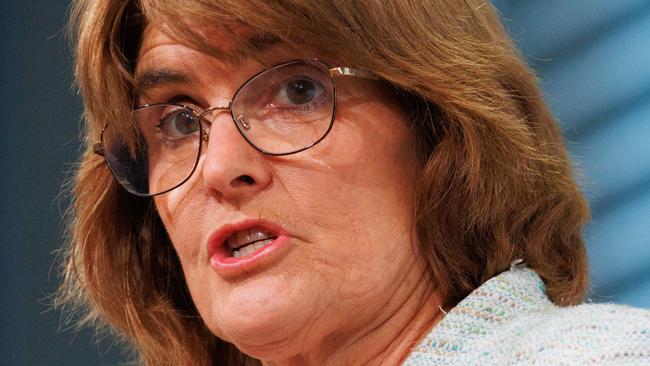
It’s an equal opportunity destroyer, hurting “absolutely everyone”, she said, not least growth in the economy.
But some in the community are experiencing more acute hardship: young workers, renters, the poor and low-income borrowers.
It’s a bitter pill and there may be more to come if inflation continues to run with abandon at an underlying rate of around 4 per cent because the level of demand keeps running ahead of supply.
“If inflation doesn’t come down, then it might be that the best medicine is, in fact, that we have to end up putting more restriction into the economy,” the Reserve Bank governor said.
Bullock’s speech on Thursday was a far more elegant contribution to the economic debate than the politically supercharged rhetoric from the Brisbane Brawler at the start of the week.
Reporters tried their best to get Bullock to dump on Jim Chalmers and his posse of provincial custodians, who in concert are behind a sharp rise in public spending and using open-mouth policy to force an easing in interest rates.
But, at least for the sake of Team Australia harmony, the Reserve Bank chief was diplomatic and deferential to a fault.
What effect did the heavy breathing from Canberra have, other than putting doubt around the central bank’s mission and expertise or eating away the vital confidence that there was co-ordination between monetary and budget policy?
Bullock said: “It is premature to be thinking about rate cuts. With underlying inflation having fallen very little over the past year in quarterly terms, the board is vigilant to upside risks.
“That is why, as the board has said, policy will need to be sufficiently restrictive until we are confident that inflation is moving sustainably towards the target range.”
Over to you, fiscal chumps.
Wednesday’s national accounts showed an ailing private sector, with both workers and employers tightening up their spending, but a public sector that is “on the tear” as the Irish say.
That means, in aggregate, as economists term it, we have an “output gap”.
So, unlike in other countries, where interest rates are falling, our central bank is still, in the governor’s words, “managing down the excess demand to a point where it’s just in line with supply”.
Bullock, obviously, is not a cold-hearted operator.
Still, could it be that the cure of high interest rates is proving to be more damaging than the disease?
No way, counters Bullock, as she must, deep in the bog of uncertainty that is the “narrow road”, where some signals say “slow down” and others declare “hurry up”.
For the next few months, the economic data will most likely continue to paint a mixed picture on the state of the economy and the course of “disinflation”.
The danger is that if the numbers come hard and fast in a single direction, such as a spike in the unemployment rate, then the RBA’s squeeze will have been too brutal.
A resurgence in inflation, however, would be even worse.
The RBA board could do without the noise and Trumpy provocations to voters that fit up officials and members for making the cost-of-living crisis worse.
Remember, inflation is the scourge, and those who aid and abet it should be held accountable.
We live in a democracy, where everyone gets to vote, although there are nine cautious people whose decisions and brain power carry more weight right now than those who are subject to rollicking three-year terms and the privileged grind of governing.




Reserve Bank governor Michele Bullock has laid out a precise explanation for how persistently high inflation is smashing the economy.